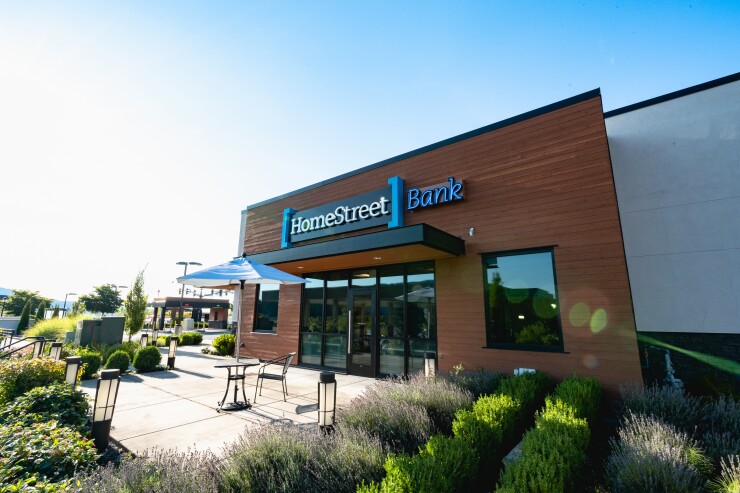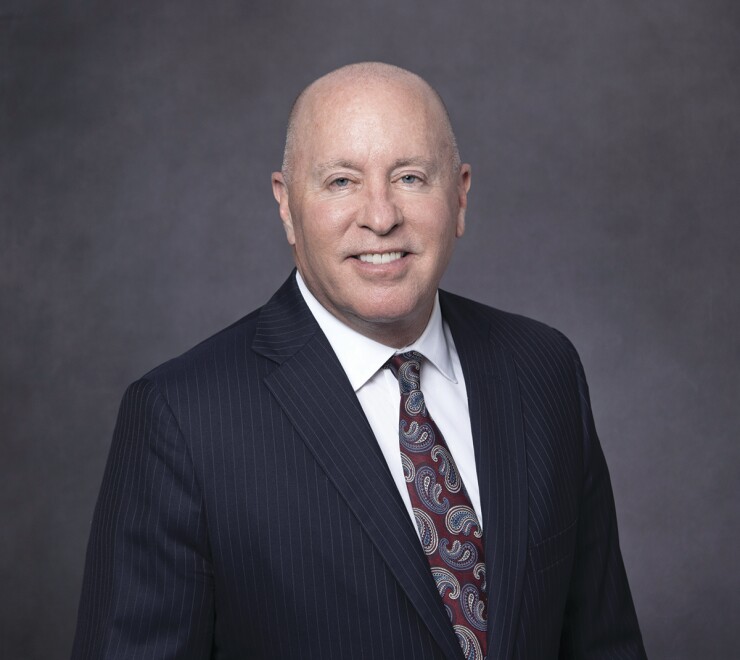
HomeStreet's first-quarter net income of $5.1 million was down 40% on a linked-quarter basis. Timothy Coffey, who covers the Seattle-based company for Janney Montgomery Scott, is forecasting subdued financial results characterized by compressed margins and declining capital ratios for several more quarters.
It's no rosy picture. Kroll Bond Rating Agency (KBRA) downgraded HomeStreet's unsecured senior debt rating earlier this month, but it's an action HomeStreet CEO Mark Mason said he understands fully.
"Our earnings are lower, and we've lowered the dividend," Mason said. "We're being cautious about how we run the business because of the environment."
Some things Mason doesn't understand, chief among them being the $9.9 billion-asset HomeStreet's stock price.
Though HomeStreet was profitable in the first quarter, and Coffey is forecasting continued profits this year and in 2024, its share price fell dramatically in April and has remained in the doldrums since. Shares closed at $6.15 Friday, down nearly 80% from the start of 2023.
Mason and other insiders have bought nearly 100,000 shares so far in May, including 70,000 by Mark Patterson, who is the lead independent director. But the purchases appear to have made little difference.
Irrational gloom
According to Mason, the level of punishment meted out to HomeStreet shares "doesn't seem to bear any relationship to the fundamentals." The CEO blamed short sellers for the majority of HomeStreet's market woes.
"I think that the short sellers in the market, as a group, have focused on certain names at a time when there is not much interest in buying these stocks, regardless of the levels they're at," Mason said. "When you have so much selling pressure and not enough buyers, you get this type of really radical declines in stock prices."
Coffey, who rates HomeStreet's stock as neutral, described the rock-bottom valuation as "not warranted," in a research note last week. The stock of a profitable, dividend-paying company "should not trade at such a massive discount to tangible book value," Coffey wrote.
According to its first-quarter 10-Q report, filed with the Securities and Exchange Commission on May 10, HomeStreet's tangible book value per share as of March 31 was $27.87.

HomeStreet is
"I keep hoping the SEC will step in and suspend short selling to provide time for the market to stabilize," Mason said. "So far, they haven't seen fit to do that."
While many investors and outside analysts have focused on deposits since the bank runs that torpedoed Silicon Valley Bank, Signature Bank and First Republic Bank, loans are a bigger issue for HomeStreet — more precisely multifamily loans that aren't prepaying at the same rates they were in 2021, when net earnings reached a record $115.4 million.
HomeStreet increased the proportion of multifamily loans on its balance sheet from 17.5% on March 31, 2019, to about 53% four years later. Problem is, the majority of HomeStreet's multifamily originations featured fixed rates for five to seven years, according to Coffey, so prepayments declined sharply once the Federal Reserve began raising interest rates and HomeStreet's own funding costs began to creep higher.
The trend has led to reduced earnings, to be sure, but they haven't shaken depositors' confidence in HomeStreet's viability. "We have not experienced any so-called runs on deposits out of security concerns or otherwise," Mason said. Indeed, excluding a decline in brokered deposits, which HomeStreet uses when they are cheaper than Federal Home Loan bank advances, total deposits increased 3% during the first quarter to $7.1 billion.
At the same time, HomeStreet continues to report strong credit quality. At $14.9 million on March 31, nonperforming assets amounted to just 0.15% of total assets. And with so much invested in multifamily loans — one of the safest asset classes — that picture isn't likely to change substantially, which should give HomeStreet time to execute a turnaround.
KBRA noted in a May 15 research note that HomeStreet has never experienced a loss in its multifamily portfolio.
Wait till next year
The company has a plan in place. In addition to slashing its dividend, HomeStreet has restricted new loan originations to variable-rate products. It has begun offering incentives to multifamily borrowers, including longer fixed-rate periods, in return for agreeing to a higher interest rate.
"We believe we have the customer base, the liquidity and the asset quality to manage through this period," Mason said. "This is a crisis of interest rate risk, not credit risk. Time allows management of interest rate risk. Time doesn't typically cure credit risk, at least not soon enough."
It's no stretch to assume the steps HomeStreet has taken will boost loan yields enough to begin widening its margin in about a year's time, Coffey said, adding that lower rates would accelerate the recovery timeline. Coffey, however, said he was in the "wait-and-see" camp regarding HomeStreet.
Banks like HomeStreet are being punished for the recent bank failures, although their business models have little or nothing in common with the way Silicon Valley, Signature and First Republic were run, according to Van Hesser, KBRA's senior managing director and chief strategist.
"Those banks featured concentrations of risk on both sides of the balance sheet and highly connected customer bases that made them vulnerable to changing stakeholder preferences," Hesser wrote in an email to American Banker. "Better managed regional banks have more diversified business risks and more prudent risk management practices."
Like Coffey, however, Hesser said it's up to the banks to win back investors.
"A predictable fallout of an unexpected shock is that investors tend to paint the entire sector with the same broad brush," Hesser wrote. "Recent events put the onus on individual banks to demonstrate that they can manage the effects of the Fed's monetary tightening."






